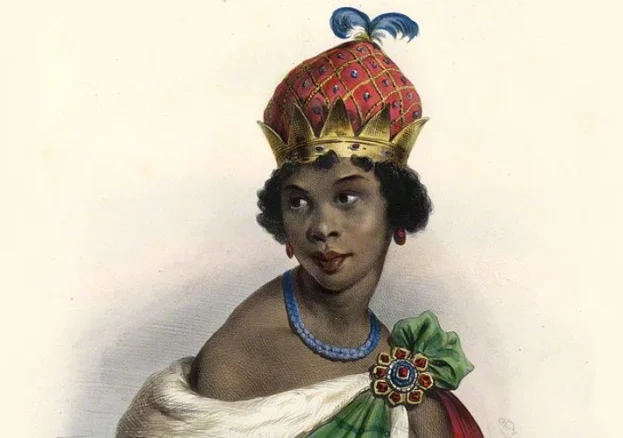
Queen Nzinga Mbande stands as one of the most extraordinary monarchs in African history, renowned for her intelligence, political and diplomatic wisdom, and unmatched bravery in the face of the Portuguese colonial onslaught in the 17th century. Her life story is a testament to the indomitable spirit of resistance against oppression and the fight for sovereignty and freedom by African peoples.
Born around 1583 to Ngola Kiluanji and Kangela, Nzinga was thrust into an era of turmoil, as the Portuguese intensified their colonial expansion, disrupting the social, political, and economic fabric of her homeland. Her upbringing in the royal family of Ndongo (in present-day Angola) imbued her with a keen understanding of statecraft and military tactics, which would later define her rule.
Her brother, Ngola Mbandi, the king of Ndongo, faced relentless pressure from Portuguese forces aiming to dominate the slave trade. The kingdom’s strategic location made it a prime target for colonial exploitation. Nzinga’s early involvement in diplomatic missions showcased her exceptional skills in negotiation and her deep commitment to her people’s welfare.
Defiance and Diplomacy
In 1622, Nzinga emerged on the international stage during a crucial meeting with João Correia de Sousa, the Portuguese governor. She sought to negotiate the freedom of her captured people and secure the sovereignty of Ndongo. In an era when African leaders were often demeaned by European colonizers, Nzinga’s refusal to accept a subservient position—opting to sit on the back of one of her attendants rather than on the floor—was a powerful act of defiance. This encounter epitomized her refusal to be diminished by colonial powers and marked the beginning of her legendary resistance.
Reign and Resistance
Following her brother’s death under mysterious circumstances, Nzinga assumed the throne of Ndongo in 1624, becoming one of the few female rulers in African history. She took on the title of Ngola, a term traditionally reserved for male leaders, and embarked on a strategic campaign to liberate her kingdom from Portuguese control.
Nzinga’s reign was characterised by her adept use of diplomacy and military tactics. Understanding the importance of alliances, she sought support from other African states and even European powers opposed to Portugal. Her conversion to Christianity and strategic marriage alliances were part of her diplomatic efforts to build a coalition against the Portuguese.
Military Strategies and Guerilla Warfare
Queen Nzinga is perhaps best known for her military acumen. She trained her army in the art of guerilla warfare, conducting hit-and-run attacks on Portuguese settlements and supply lines, which severely disrupted their operations. Her leadership inspired other African leaders to resist European colonization, making her a symbol of pan-African resistance.
Nzinga also provided sanctuary to runaway slaves and soldiers, which not only weakened Portuguese economic interests but also strengthened her own forces. Her capital, Matamba, became a refuge for those fleeing the brutality of slavery, embodying her vision of a sovereign and united African resistance against colonialism.
The Later Years and Death
After decades of resistance, Nzinga’s later years continued to be characterized by her efforts to secure the sovereignty and freedom of her kingdoms. Despite her fierce opposition, the Portuguese continued to exert pressure on her territories, seeking to expand their colonial holdings and control the lucrative slave trade.
Throughout her life, Nzinga was known not only for her military tactics but also for her diplomatic skills and intelligence. She engaged in negotiations with the Portuguese and other European powers, seeking to play them against each other to the advantage of her people. She also provided sanctuary to runaway slaves and those affected by the slave trade, undermining Portuguese efforts to capture slaves in the region.
Nzinga converted to Christianity, a strategic move that she hoped would gain her the support of European Christian allies against the Portuguese. She adopted the Christian name Ana de Sousa in honor of her godparents, the Portuguese governor João Correia de Sousa and his wife. However, her Christian faith did not deter her commitment to fighting Portuguese influence.
Despite her relentless efforts, the Portuguese gradually increased their control over the region. Yet, Nzinga’s resistance led to her becoming a symbol of defiance and resilience, inspiring her people to continue the fight against colonial oppression.
Queen Nzinga Mbande died in 1663 at the age of 80 or 81. Her death marked the end of an era, but her legacy lived on. She is remembered as a skilled negotiator, a fearless warrior, and a visionary leader who tirelessly fought for the autonomy and dignity of her people.
Queen Nzinga of Ndongo and Matamba remains a towering figure in the history of resistance against colonialism. Her sophisticated understanding of diplomacy, coupled with her military prowess, made her one of the most formidable opponents of colonial forces in Africa. Nzinga’s story is a poignant reminder of the resilience and courage of African leaders in the face of overwhelming odds.
Her legacy continues to inspire those who seek justice and equality, making her not just a historical figure but a timeless symbol of the struggle for freedom and dignity. Queen Nzinga’s life and achievements underscore the rich tapestry of African history, a narrative of resistance and sovereignty that challenges the colonial depiction of Africans as passive victims. Through her leadership, Nzinga has etched an indelible mark on the global consciousness, celebrating the spirit of resilience and the unyielding pursuit of freedom.
